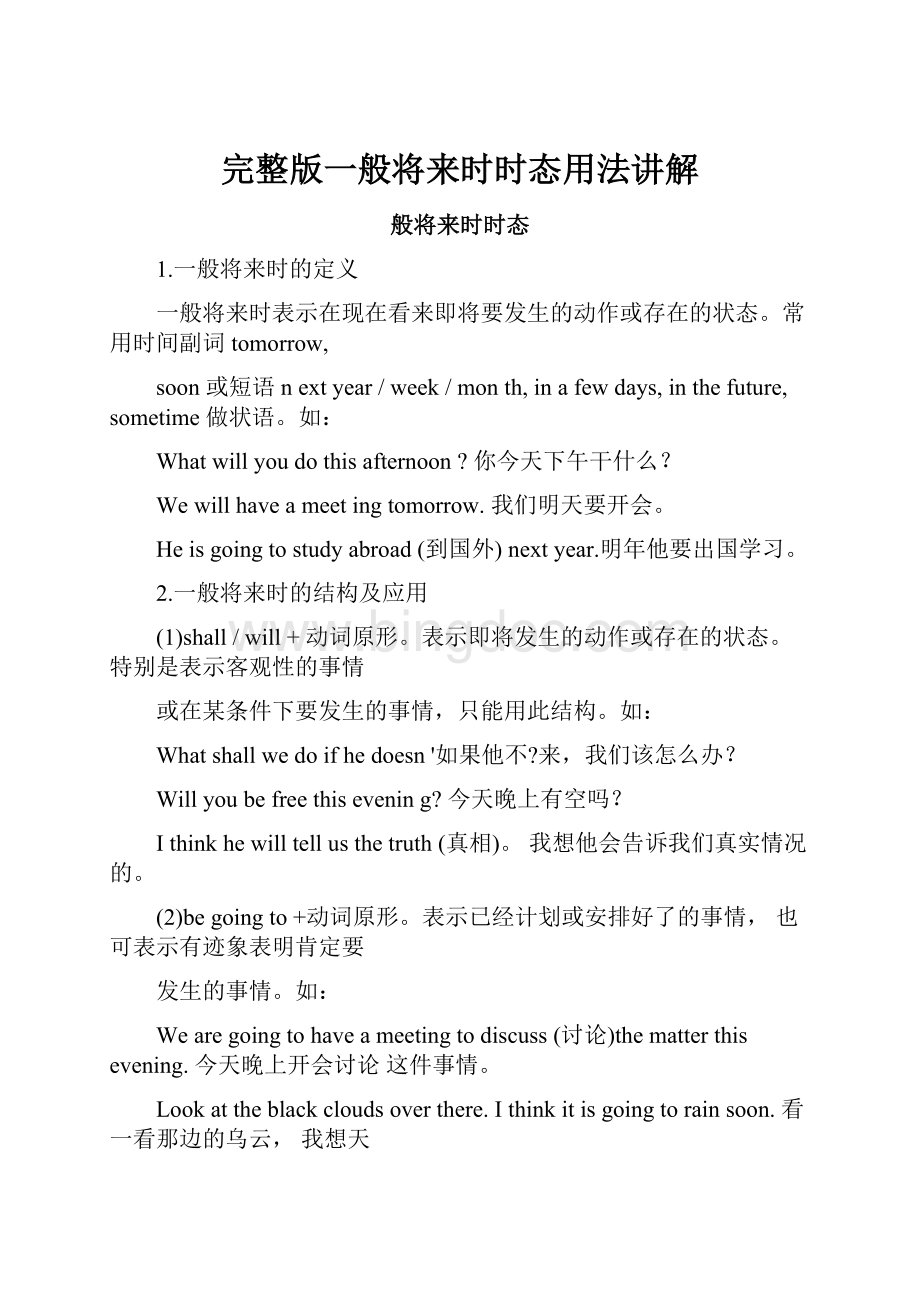完整版一般将来时时态用法讲解.docx
《完整版一般将来时时态用法讲解.docx》由会员分享,可在线阅读,更多相关《完整版一般将来时时态用法讲解.docx(24页珍藏版)》请在冰点文库上搜索。

完整版一般将来时时态用法讲解
般将来时时态
1.一般将来时的定义
一般将来时表示在现在看来即将要发生的动作或存在的状态。
常用时间副词tomorrow,
soon或短语nextyear/week/month,inafewdays,inthefuture,sometime做状语。
如:
Whatwillyoudothisafternoon?
你今天下午干什么?
Wewillhaveameetingtomorrow.我们明天要开会。
Heisgoingtostudyabroad(到国外)nextyear.明年他要出国学习。
2.一般将来时的结构及应用
(1)shall/will+动词原形。
表示即将发生的动作或存在的状态。
特别是表示客观性的事情
或在某条件下要发生的事情,只能用此结构。
如:
Whatshallwedoifhedoesn'如果他不?
来,我们该怎么办?
Willyoubefreethisevening?
今天晚上有空吗?
Ithinkhewilltellusthetruth(真相)。
我想他会告诉我们真实情况的。
(2)begoingto+动词原形。
表示已经计划或安排好了的事情,也可表示有迹象表明肯定要
发生的事情。
如:
Wearegoingtohaveameetingtodiscuss(讨论)thematterthisevening.今天晚上开会讨论这件事情。
Lookattheblackcloudsoverthere.Ithinkitisgoingtorainsoon.看一看那边的乌云,我想天
要下雨了。
ThereisgoingtobeanEnglisheveningthisweek.本周要举行一个英语晚会。
(3)be+现在分词。
表示即将发生的动作或存在的状态。
这个句型中动词主要是瞬间动词:
come,go,leave,arrive,begin,start,stop,close,open,die,join,borrow,buy等。
如:
Goahead,andI'mcon走前面一点吧,我就来。
Thedogisdying.那条狗要死了。
Hurryup.Theshopisclosing.快点,商店就要关门了。
(4)一般现在时。
表示一种严格按照计划进行的动作。
比方说,上课、飞机起飞、火车离
站等。
如:
Don'thurry.Themeetingstartsataquarterpasteight.不要匆忙,回忆八点过一刻开始。
Thebusgoesbackatfourthirty.汽车四点返回。
巩固练习:
一、用所给动词的适当形式填空
1.LiLeitellsmehe(visit)theGreatWall(长城)thisweekend.
2.Mymother(buy)meapairofnewtrouserstomorrow.
3.Shesaysshe(leave)soon.
4.We(go)skatingifitdoesn'trainnextSunday.
5.There(be)anEnglisheveningnextweek.
6.Thinkover,andyou(get)agoodidea.
7.Jim(have)apicnicnextMonday?
-No,he.
8.I(miss)youafteryouleavehere.
9.Who(teach)youEnglishnextyear
10.He(be)backinthreehours.
11.Lookattheseclouds.It(rain).
二、改错:
每处划线中有错误,在题后改正
1.Hewillsinganddancesforustomorrow.
2.Areyougoingtoswim?
Yes,Iwi_
3.HewillhelpJimwithhisEnglisheveryday.
4.Willhersistersingsasongformetomorrow?
5.Theywilln'planttreesnextweek.
6.Aretheygoingtoplaysbasketballtomorrow?
7.Willwegotovisitthefactorytomorrow?
8.PaulwillbegoingtomakedumplingsforEmma.
9.AretheboysgoingtotheGreatWallnextmonth?
Yes,theywill_
三、句型转换:
』misgoingtoplayfootballtomorrowMarywillcleanthewindowsnextweek.
否定句:
一般疑问句:
两回答:
特殊疑问句:
四、选择题
()1.—AreyougoingtoourEnglishteam?
—Yes,Iam.
A.takepartinB.joinC.tookpartinD.joined
()2.XuXiaandherteammatesaretheUSAnextweek.
A.leavingforB.leaveforC.leaveD.left
()3.ThereanEnglishpartyinourclassnextweek.
A.isgoingtohaveB.isgoingtobeC.willhaveD.Have
()4.Ifittomorrow,wewillgotothepark.
A.isn'trainB.don'trainC.doesn'trainD.won'train
()5.Thereafootballmatchnextweek.Shallwegoandwatchit?
A.willhaveB.hasC.haveD.willbe
“Wouldyouminddoing句型透视
mind用作动词时,习惯后接动名词(短语)作宾语,而不接动词不定式,常用于Wouldyouminddoing?
句型中,具体用法是:
1.“Wouldyouminddoing…?
"句型常用于表示请求,意思是请你做你是否介意?
、请你做……好吗?
”,是一种比较客气的表达方式。
如:
Wouldyoumindturningoffthelightintheroom?
请你把房间里的灯关掉好吗?
如果要表示“请你不要做……你是否介意?
、请你不要做……好吗?
”,只需要在doing
前面加上not•如:
Wouldyoumindnotstandinginfrontofme?
请你不要站在我的前面好吗?
2.如果同意,表示不介意时,可用如下用语来表达:
Certainly/Ofcoursenot./Notatall./No,notatall;如果不同意,表示介意时,常用“Sorry/I‘msof对不起)及陈述某种理由来表示拒绝或反对。
如:
—Wouldyoumindgoingtothemoviesthisevening?
今晚去看电影好吗?
—I‘msorry.ButIhaven'tfinishedmyhomeworkyet.对不起,我的作业还没有完成。
学习时还要注意:
1.“Wouldyouminddoing•?
•"句型中的would也可用do代替,但语气较生硬,不如用would客气。
2.“Wouldyouminddoing•?
•"句型中的逻辑主语只能是谈话的对方you.如果想要对方
允许自己做某事,可用“Wouldyoumindmydoing…?
•”句型,如:
Wouldyoumindmysmokinghere?
你介意我在这里吸烟吗?
巩固练习:
一、用下面提供的短语完成句子。
1.helpmewashmyclothes
Wouldyoumind?
2.giveheracupoftea
Wouldyoumind?
3.helphimmendhiscar
Doyouhave?
4.walkontheroad
Wouldyoumindontheroad?
二、选择题
()1.—Wouldyoumindusinthegame?
—Notatall.
A.joiningB.joinC.joininD.joiningin
()2.—WouldyouliketoclimbmountainswithmethisSunday?
—I'dloveto.ButIplaytabletennisagainstClassThree.
A.amgoingB.amgoingtoC.amD.goingto
()3.—Wouldyoumindhere?
—I'msorryaboutthat.IwHiejeeome
A.nosmokingB.notsmokingC.nosmokeD.notsmoke
hadbetter用法详解
1.hadbetter的基本用法特点
其意为最好”应该”后接动词原形,与情态动词should用法相似,其中的had通常缩略为':
You'dbettergetsomesleep你最好去睡一会儿。
Wehadbettergobeforeitrains.我们最好在下雨前就去。
2.hadbetter如何构成否定式和疑问式
构成否定式时,通常将not置于hadbetter之后(而不是had之后);而构成疑问式时,
则通常将had(而不是hadbetter)置于主语之前:
I'dbetternosturbhim.我最好别去打扰他。
Whathadwebetterdo?
我们最好怎么办?
练习题
dbettergotoseeadoctor.
()1.—I'mafraidyouhaveacold.You
A.
No,Ihavenotime.
B.That'sagoodidea.
C.
It'sverykindofyou.
D.
I'msorrytohearthat
(
)2.—
I'mfat.WhatshouldIdo?
一
You'dbettereatmeatand
fruits.
A.less;moreB.less;lessC.more;lessD.more;more
sbadforhim
()3.Youhadbetteraskyourbrotherplayingcomputergames.It
A.togiveupB.nottogiveupC.togiveitupD.notgiveitup
()4.—Ihaveastomachache.WhatshouldIdo?
—Youdrinksweetwaterandeatsweetfood.
A.hadbetternot;shouldn
't
B.
should;hadbetter
C.hadbetter;hadbetter
D.
shouldn't;should
(
)5.—Ihaveatoothache.
—Youshould.
A.drinklotsofwater
B.
takearest
C.seeadentist
D.haveagoodsleep
情态动词的基本用法归纳
情态动词有can(could),may(might),must,haveto,shall(should,will(would),need(needed),oughtto等。
情态动词无人称和数的变化;不能单独使用,必须与其后的动词原形构成谓语。
一、can,could
1.表示能力(体力、知识、技能)。
Canyouliftthisheavybox?
(体力)
MarycanspeakthreeIanguages.(知识)
Canyouskate?
(技能)
2.表示请求和允许。
CanIgonow?
Yes,youcan./No,youcan't.
此时可与may互换。
在疑问句中还可用couId,might代替,不是过去式,只是语气更委婉,不能用于肯定句和答语中。
CouIdIcometoseeyoutomorrow?
Yes,youcan.(No,I'mafraidnot.)
3.表示客观可能性(客观原因形成的能力)。
They'vechangedthetimetabIe,sowecangobybusinstead.
ThishaIIcanhoId500peopIeatIeast.
4.表示推测(惊讶、怀疑、不相信的态度),用于疑问句、否定句和感叹句中。
Canthisbetrue?
Thiscan'tbedonebyhim.
Howcanthisbetrue?
二、may,might
1.表示请求和允许。
might比may语气更委婉,而不是过去式。
否定回答时可用can't
或mustn',表示不可以,禁止”。
Might/MayIsmokeinthisroom?
No,youmustn't.
May/MightItakethisbookoutoftheroom?
CanI...?
在口语中更常见。
Yes,youcan.(No,youcan't/mustn't.)用MayI...?
征徇对方许可时比较正式和客气,而用
2.用于祈使句,表示祝愿。
Mayyousucceed!
3.表示推测、可能性(不用于疑问句)。
might不是过去式,它所表示的可能性比may小。
1.Hemay/mightbeverybusynow.
2.Yourmothermay/mightnotknowthetruth.
三、must,haveto
1.表示必须、必要。
Youmustcomeintime.
在回答引出的问句时,如果是否定的,不能用mustn'(禁止,不准),而用needn't,don't
haveto(不必).
Mustwehandinourexercisebookstoday?
Yes,youmust.
No,youdon'thaveto/youneedn't.
2.must是说话人的主观看法,而haveto则强调客观需要。
must只有一般现在时,have
to有更多的时态形式。
1)heplayisn'tinteresting,Ireallymustgonow.
2)IhadtoworkwhenIwasyourage.
3.表示推测、可能性(只用于肯定的陈述句)
1)You'reTom'sgoodfriend,soyoumustknowwhathelikesbest.
2)Yourmothermustbewaitingforyounow.
四、need
1.need作情态动词用时,常用于疑问句、否定句。
在肯定句中一般用must,haveto,ought
to,should代替。
1)Youneedn'tcomesoearly.
2)NeedIfinishtheworktoday?
t.
Yes,youmust./No,youneedn
2.need作实义动词用时,有人称、时态和数的变化。
而need后面只能接带to的不定式。
Heneedstofinishhishomeworktoday.
五、shall,should
1.shall用于第一人称,征求对方的意见。
Whatshallwedothisevening?
2.shall用于第二、三人称,表示说话人给对方的命令、警告、允诺或威胁。
1).Youshallfailifyoudon'twork警告d-X
2)HeshallhavethebookwhenIfinishit.(允诺)
3)Heshallbepunished.(威胁)
六、will,would
1.表示请求、建议等,would更委婉。
Will/Wouldyoupassmetheball,please?
2..表示意志、愿望和决心。
1).Iwillneverdothatagain.
2.)Theyaskedhimifhewouldgoabroad.
3.
usedto正式,且
would表示过去反复发生的动作或某种倾向。
would表示过去习惯时比没有“现已无此习惯”的含义。
1).Duringthevacation,hewouldvisitmeeveryotherday.
2).Thewoundwouldnotheal.
七、should
1.should表示“应该”
1).Ishouldhelpherbecausesheisintrouble.
2.表示推测should,(客观推测),must(主观推测)。
1).Hemustbehomebynow.(断定他已到家)
2)Heoughtto/shouldbehomebynow.(不太肯定)
3)Thisiswheretheoilmustbe.(直爽)
4)Thisiswheretheoiloughtto/shouldbe.(含蓄)练习题
()1.—MayIaskyousomequestions,Dr.Wang?
A.You'rewelcome.C.No,I'mbusy.
B.Sure,goahead.
D.Yes,youmust.
—No,youdon'thtaov.e
()6.Mymotherisill.Istayathometotakecareofher.
()2.—MustItakepartintheactivity?
()7.—MayIuseyourdictionary,Lily?
—Sure,.
A.goaheadB.youcanaskBill
反身代词用法归纳
一、反身代词的基本形式
反身代词是oneself根据所指词的人称、性别、单复数等的变化可以有myself,himself,herself,yourself,itself,ourselves,yourselves,themselves等形式。
二、oneself与himself
当one指人时,其相应的反身代词通常用oneself,在美国英语中也可用himself:
Oneshouldnotpraiseoneself[himself].一个人不应该自吹自擂。
三、反身代词的句法功能:
1.用作同位语(加强被修饰词的语气,紧放在被修饰名词后,或句末:
Theboxitselfisnotsoheavy.箱子本身并不重。
Martinhimselfattendedthesickman.马丁亲自照顾病人。
2.用作宾语(动词或介词的宾语):
Takegoodcareofyourself.照顾好自己。
Shecouldnotmakeherselfunderstood.她不能使别人听懂她的话。
Thechildcriedhimselftosleep.孩子哭着哭着睡着了。
3.用作表语
Thepoorboywasmyself.那个可怜的孩子就是我自己。
Theoneswhoreallywantitareourselves.真正想要它的是我们自己。
代词列表
人称代词
主格
人称代词
宾格
形容词性
物主代词
名词性
物主代词
反身代词
I
me
my
mine
myself
we
us
our
ours
ourselves
you
you
your
yours
yourself
yourselves
she
her
her
hers
herself
he
him
his
his
himself
it
it
its
its
itself
they
them
their
theirs
themselves
主格做主语
宾格做宾语
放在动词介词
后
放在名词前
不可单独用
替代形代+名词
不可与名词连
用
by后接
反身代词
()1.—Heplaysbasketballsowell!
Whotaught?
—Helearntitby.
A.him;him
B.himself;himself
C.him;himself
D.himself;him
teammatch
skating